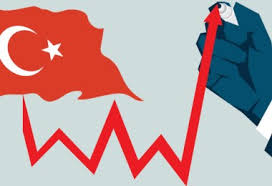Turkey’s economy will grow 4.8% in 2021, rebounding strongly from a slump brought on by the coronavirus pandemic, while inflation was seen remaining well above the government’s target until at least 2023, a Reuters poll showed.
The median forecast of 34 economists, polled from April 6-13, was for economic expansion of 4.8% in 2021, after growth was expected to surge to 14.9% in the second quarter due to a so-called base effect.
Turkey’s economy grew 1.8% last year, emerging as one of only a few globally to avoid a contraction due to the coronavirus pandemic. It contracted more than 10% in the second quarter, however it recovered thanks to a burst of state bank lending in the second half of the year.
“In Turkey, authorities could revert to policies that prioritise short-term growth via looser monetary policy and faster loan growth,” said UniCredit, revising up its 2021 growth forecast due to an expected expansion in the first quarter.
A sustainable easing of coronavirus restrictions and recovery in tourism could support the service sector, UniCredit also said in a research note, adding that exports would drive economic growth this year.
This month the government imposed weekend lockdowns, limited restaurant services and gatherings as coronavirus infections spiked to an all time high, just before the summer tourism season, a main source of foreign currency revenue.
Growth in the $760 billion economy has fallen below its potential 5% levels after a 2018 currency crisis sparked recession and the pandemic halted a nascent recovery. The poll median showed the economy was expected to expand 3.7% next year.
Elevated inflation
Turkey’s annual inflation climbed above 16% in March for the first time since mid-2019, as further lira weakness pressured prices via imports. The central bank expects inflation to drop to 9.4% at year-end and has pledged tight policy until it hits the 5% target in 2023.
While economists had already expected inflation to come in higher at year-end, President Tayyip Erdogan’s sacking of the former hawkish governor led to expectations of looser policy, prompting the lira to shed 12% in a week.
The currency’s sharp decline, as well as the dovish new governor, who previously expressed his view that high rates lead to high inflation, led economists to revise their inflation estimates higher. Central bank governor Sahap Kavcioglu reiterated his commitment to tight policy, relieving some investor concern.
Inflation was expected to decline to 14.1% by the end of 2021, up from 11.6% in the previous poll. It was seen dropping only to 9.8% by the end of 2023, when the central bank has said it would reach its target of 5%.
“Headline inflation will likely approach 18% in May and remain close to this level until August, before easing…The pass through from a weaker lira might counterbalance most of the disinflationary base effect in the second half of 2021,” UniCredit said.
The central bank’s policy rate was expected to be lowered gradually to 15% by the end of the year, from 19% currently, and to 12% by the end of 2022, the poll also showed.
Having recorded a rare surplus in 2019 as the economy slowed, the current account balance has since turned to a deficit and widened dramatically as exports and tourism revenues sagged due to the pandemic.
The deficit was expected to stand at 3.2% of GDP in 2021 and 2.5% next year, according to the poll.
Reuters
